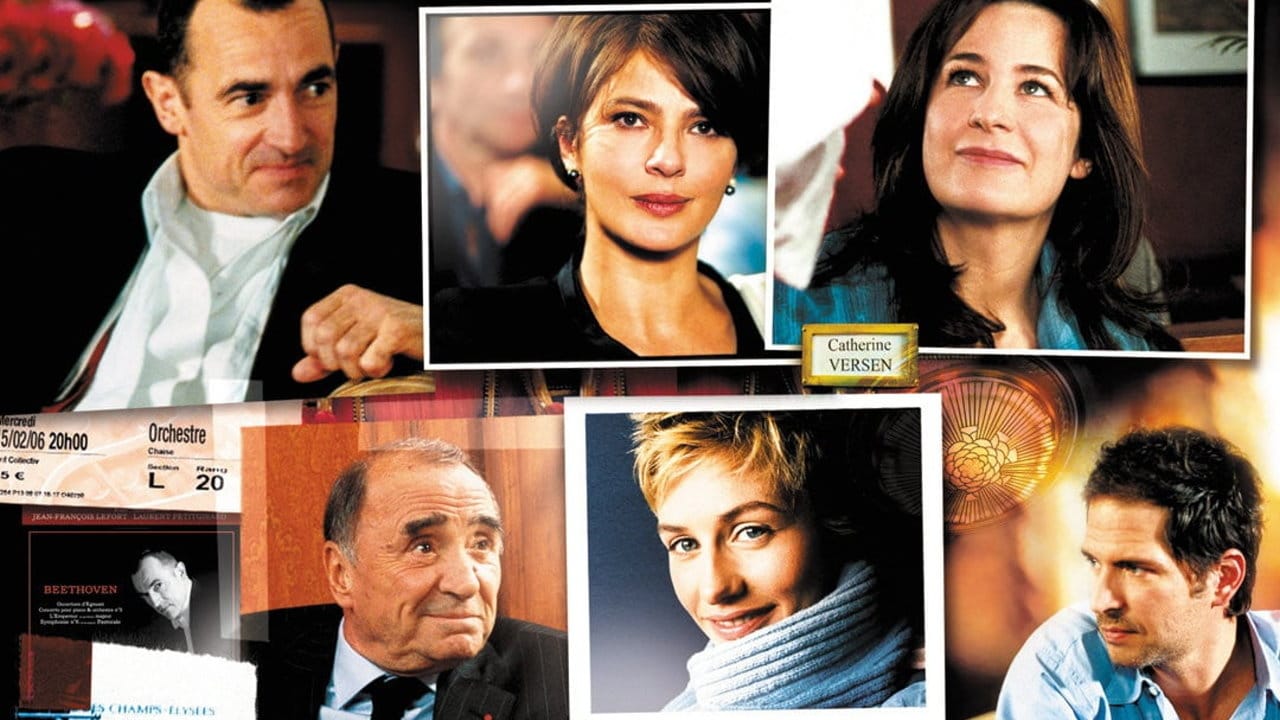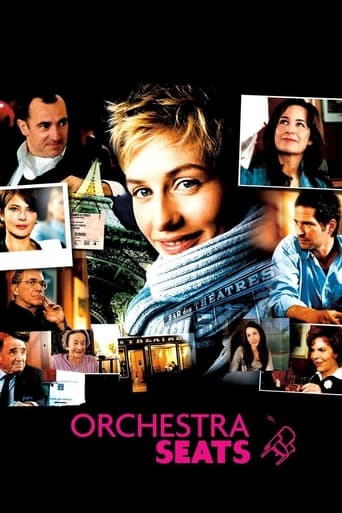

AVENUE MONTAIGNE (AKA Fauteuils d'Orchestre, or Orchestra Seats) works on many levels. As directed and written (with her son Christopher Thompson who also acts in the film) by Danièle Thompson the story is about need, expectations, disappointments and the opening of new doors. It is sweet, tender, beautifully acted and delivers Paris to the viewer on a dream- like encounter. Jessica (Cécile De France) lives in Mâcon, France with her aging grandmother Madame Roux (veteran actress Suzanne Flon in her last appearance in film): they share a desire - loving luxury - but both are poor in money and rich in spirit. Jessica decides to move to Paris to find good fortune. She has no money and no place to live so she finally finds a job as a waitress in bar next on Avenue Montaigne that caters to the surrounding theaters and the wealthy inhabitants of the area. Not being the requisite 'male waiter' her attention is paid to the people of luxury around her. She meets a famous pianist (Jean-François Lefort) who is married to his manager Valentine (Laura Morante) and their life of luxury is tainted by the pianist's tiring of the superficiality of his career, a famous actress Caterine Versen (Valérie Lemercier) who makes money on TV soaps and struggles with Feydeau stage productions but really would chuck it all to star in a film about Simone de Beauvoir and Sartre directed by the famous Brian Sobinsky (Sydney Pollack), and a great art collector Jacques Grumberg (Claude Brasseur) who is auctioning off his entire art collection to the pleasure of his new young girlfriend Valérie (Annelise Hesme) but to the disappointment of his son Professor Frédéric Grumberg (Christopher Thompson) , and is present in the retirement days of the theater manager Dani (Claudie). Jessica proves to be the catalyst for change in each of these people's lives and fulfills her dream of providing luxury by obtaining an orchestra seat for her grandmother at the pianist's farewell formal concert. Though the plot may sound complex it all spins out in meaningful ways that manage to tie the multiple stories together because of the presence of Jessica. The cinematography by Jean- Marc Fabre sparkles as doe the musical score by Nicola Piovani (with a great assist from Beethoven!). It is a bit of French froth with a message and a pure delight to watch - over and over. Grady Harp
... View MoreDaniele and Christopher Thomspon's light melodrama "Avenue Montaigne" (AKA Fauteuils d'orchestre) paints a wandering portrait of life in Paris' theatre district, centered on a small bistro which brings together stars, writers, directors, musicians, celebrity worshipers, and waiters. Several story arcs involving a variety of somewhat neurotic main characters are woven together around the story of the single character who does not appear to indulge in any particular neuroses - Jessica (Cecile DeFrance), a young woman who has come to Paris in hopes of creating an independent life for herself. Tirelessly hopeful, homeless, and delightful, Jessica's willfulness and charming personality wins her a job as the first female employee of the bistro around which most of the stories evolve.Here, our heroine meets a brilliant pianist who is sick of the constraints of his own success and is married to a beloved wife who has sacrificed her own career to support his (Lefort - Albert DuPontel); A father and son (the Grumbergs, played by Claude Brasseur and Christopher Thompson) whose strained relationship is complicated by the father's very successful habit of collecting great art; A very high-strung, experienced and intelligent aging actress, who is terrified that her greatest opportunities may lie behind her (Catherine - Valerie Lemercier), and others.Jessica's elderly and somewhat senile grandmother, who raised her, plays a pivotal, but largely behind-the-scenes role in all of this. In a sense Jessica comes to Paris to allow her grandmother to vicariously live on through Jessica just as much as she does so in order to find her own path.The stories implied above are very nicely juxtaposed and the overall structure of the film is reminiscent of other excellent French and Italian melodramas. Avenue Montaigne, as most mainstream melodramas do, pays off with resolution, but does not challenge believability (often a problem for modernistic melodrama) and is, like the complex characters it examines, not entirely predictable.Uplifting, but honest and realistic, the film is very well acted all-around, excellently scripted and nicely directed and edited. I found Ms DeFrance, Valerie Lemercier and Albert Dupontel particularly outstanding. The soundtrack is also quite nicely integrated into the action of the film, sometimes giving the film a sometimes-needed touch of magical fantasy.Highly recommended for the romance/melodrama crowd. Recommended for others.
... View MoreYoung Jessica (Cécile de France), fresh from the countryside where she cared for her dying grandmother, arrives in Paris and immediately gets a job at a traditionally male-staffed café on Avenue Montaigne. There, she becomes involved in the personal and professional lives of the performers working nearby, including an I-want-to-get-away-from here- classical pianist named Jean-François (Albert Dupontel) a TV soap actress named Catherine (Valérie Lemercier) and other famous people stationed on the Avenue as well. Avenue Montaigne gets lost in its on foam and portrays a callous aesthetic with B-list actors from France trying to prove they're worth a damn. While it is an enjoyable premise that starts out great, the foam from that cappuccino overtakes your appetite and spoils it deeply. The film is as frothy as they come, a 1 hr. 45 min. trip into the heat of the avenue and the annoyances of the characters, finally culminating in a "script- writer- gone-bad" ending which has that loathsome smell of Hollywood.
... View More"The question is, what's this all about, and why must we concern ourselves with the 'predicaments' of people who from the looks of it are so singularly fortunate in life?" (Chris Knipp).Chris Knipp, no offence, hasn't understood the movie's main idea at all. This, in my experience, is what the movie is all about the separation between "high class" classical music and life. Classical music, as all music, stems from life itself, is inspired and shaped by it. One can see how, exemplified by the pianist, this form of human expression is put in the strait-jacket of so-called "high culture". Said pianist is fortunate indeed to have his talent, but he's hardly able to breathe, to enjoy and live his talents because he's made to put up a show, to dance to the tune of what he himself calls "the system".
... View More